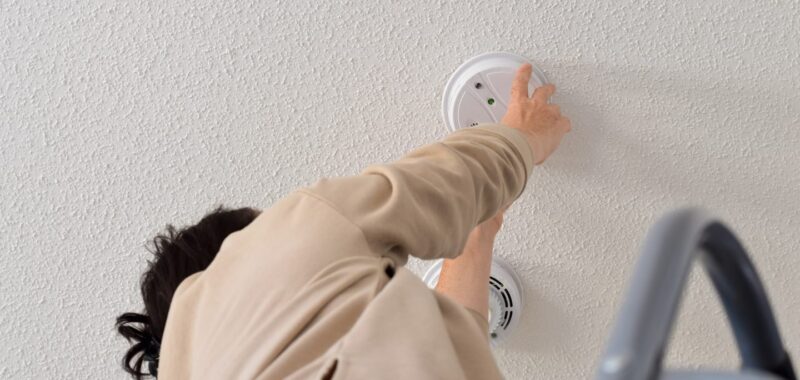There are seven main reasons a smoke alarm might appear to go off for no reason: low batteries, age, dust, particulates, humidity, bugs and fireplace smoke. However, you should never disregard a chirping smoke alarm.
Although false alarms do happen, it’s important to take them seriously and follow fire safety protocols until you can confirm there is no smoke or fire. Smoke detectors can detect hidden electrical fires before there’s a visible blaze . Make sure to regularly keep your device clean and replace its batteries.
A smoke alarm keeps your home and your family safe from household fires, but sometimes it starts chirping when there isn’t noticeable smoke. Here’s more about why your smoke alarm might go off for no reason.
1. Low batteries
A single, high-pitched chirp roughly every 30 seconds from a smoke alarm typically indicates that the batteries are low and need to be replaced .
2. Age
A smoke alarm should last around 10 years. After 10 years, they may malfunction or produce false alarms . If your detector is more than a decade old or you don’t know how old it is, it’s a good idea to replace it with a new one.
3. Dust, dirt, environmental smoke
Dust and dirt can build up in your smoke alarm and interfere with the battery connection and block the smoke sensors, especially during a home renovation. Smoke from wildfires can also trigger a false alarm. To keep your smoke alarm clean, use your vacuum cleaner or a canister of compressed air for cleaning electronics .
4. Burnt food
Smoke detectors sometimes misread the scent of burnt food in the air as smoke even if there’s no actual smoke.
To minimize this kind of false alarm, place your smoke detector in a better spot, such as in a hallway adjoining the kitchen instead of in the kitchen.
5. High humidity and/or steam
Smoke alarms can’t always tell the difference between smoke and steam. A lengthy hot shower or water left boiling may set off a smoke alarm.
With proper ventilation in your kitchen and bathroom, you can minimize this issue. A little fresh air goes a long way, so open the windows to help with additional ventilation .
6. Bugs
Sometimes, small bugs and spiders looking for a cozy dark spot may crawl into your smoke detector. Similar to dust and debris, they can disrupt the battery connection or block sensors to accidentally trigger the alarm. Remove the faceplate to inspect for and clean out unwanted insect guests .
7. Using a gas or wood fireplace
A dirty chimney, blocked chimney or improper damper settings could cause smoke to back up into your home and trigger the alarm. Keep your fireplace clean and regularly schedule a chimney sweep and inspection.
How to troubleshoot a chirping smoke alarm
The first step to troubleshooting your smoke alarm is to figure out what noise it’s making and what that signals. Is it actually detecting smoke? Or does it just need a little care? According to the National Fire Protection Association (NFPA):
-
A continuous set of three beeps means smoke is detected and in the area of the beeping device.
-
A single beep or chirp 30 to 60 seconds apart means the battery is low. If the single beeps continue even after changing batteries, this could indicate dust in the alarm or that it needs replacing.
-
If your smoke alarm also detects carbon monoxide, multiple beeps or chirps could mean something else.
If you’ve covered all your bases and your alarm is still chirping, check your smoke alarm manufacturer’s website or get in touch with your home security company. You can also contact your local fire department’s nonemergency line to schedule an inspection.
Where do I need a smoke alarm in my home?
How often do I need to test my smoke alarm?
What if someone in my home is deaf or hard of hearing?

